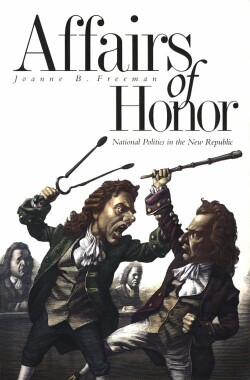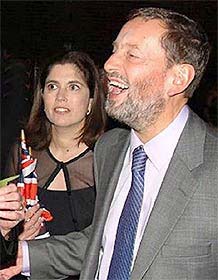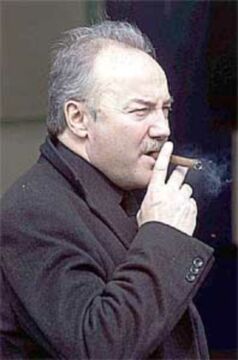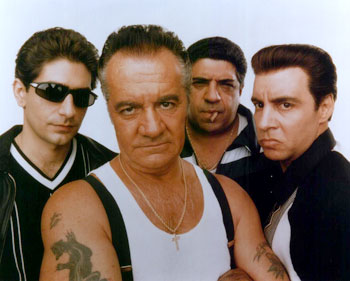What Was the Founders’ “Sacred Honor”?
AFFAIRS OF HONOUR:
NATIONAL POLITICS IN THE
NEW
REPUBLIC
by Joanne B. Freeman
Yale University Press, 376 pp, $29.95
0 300 08877 9
Joanne B. Freeman, a young lecturer at Yale, has done some valuable and
pioneering work into the investigation of honour’s importance to the
founding of the American Republic. For an age in which the very word has an
alien, faintly repellent sound (we associate “honour” killings with
countries where women are bought and sold like cattle), she has done much to
explain its meaning and importance to those who were in the vanguard of
modernity for their time. Among the Founding Fathers, she tells us,
“Honour” was used interchangeably with “reputation” but
it meant “reputation with a moral dimension and an élite
cast”. It was, moreover, “the core of a man’s identity, his
sense of self, his manhood”, which is why even in those relatively
enlightened times it not infrequently involved men in single, and lethal, combat
over real or imagined slights.
To Americans, by far the most famous of all duels is that which was fought in
July, 1804, at Weehauken, New Jersey between two heroes of the War of
Independence: Colonel Aaron Burr, who was then vice president, and General
Alexander Hamilton, who had been the closest aide-de-camp of General Washington
and Secretary of the Treasury during Washington’s presidency. Burr killed
Hamilton, who had proclaimed his intention of firing above his opponent’s
head, destroying his own political career in the process. Miss Freeman devotes a
substantial portion of her book to this duel (recycling much of the material she
had earlier published in a seminal article in the William and Mary
Quarterly), showing how familiar all its elements were in the political and
social context of the early Republic — all, that is, save in its having
resulted in the death of one of the principals, which was a comparatively rare
occurrence.
The problem with the book is that, although the author several times shows
that she knows better, she persistently treats the 18th century
honour culture as if it were an indigenous product that grew up among the
American Founders as a result of their political situation and that presented
them with unique problems of reconciling the new democratic and republican
spirit with the demands of a traditional aristocratic code. Thus she writes that
“the code of honour did more than channel and monitor political conflict;
it formed the very infrastructure of national politics, providing a governing
logic and weapons of war”.
There were no
organized parties in this unstructured new arena, no set teams of combat or
institutionalized rules for battle. Political combat in the new national
government was like a war without uniforms; it was almost impossible to
distinguish friends from foes. National politics was personal, alliances were
unpredictable, and victory went to those who trusted the right people at the
right time in the right way.
The implication throughout her book is that the honour culture evolved in
order to give public men a way to cope with partisan confusion and fluidity. But
the honour culture long antedated the foundation of the Republic, and what looks
to the historian like a confusion of parties and factions was more likely the
consequence than the cause of honour’s influence.
More seriously, just as honour is seen as the result of the inchoate
political system, so Miss Freeman suggests that it disappeared with the
emergence of reasonably stable party structures — “a ritualized,
honour-bound, personal level of political interaction” having allegedly
“persisted until the anonymity of formal national political parties
altered the tone of politics forever”. Except that it didn’t. She
devotes no attention at all to it in the colonial period when it was already, or
the antebellum era in the South where it was still, an important feature of
daily life. Nor does she look beyond the American context, an excessive
concentration on which makes her paradoxically unable to give due emphasis to
what was genuinely new and original about the honour culture in the United
States.
This was the early association of the old aristocratic standard with a new
and democratic concern for public opinion.
When a duel was
particularly controversial (she writes) — when a duelist died or a chief
was involved — politicians capitalized on widespread public interest with
contending newspaper accounts, both sides attempting to win public approval
while dishonouring their foes. Regardless of his behavior on the field, a
duelist’s reputation depended on the success or failure of these publicity
campaigns. Political duels were won by the faction that best controlled public
opinion.
It is true that she quotes one contemporary who deplores this practice,
noting that “there is not another country in christendom — probably
not in the world — where the seconds in a duel. . . have the
presumption, immediately after the contest, to publish with the signature of
their names, a detailed relation of its commencement, progress and catastrophe,
together with encomiums on the gallant behavior of their respective
principals.” But how one wishes that she had pursued even one of
the several lines of inquiry suggested here instead of persisting in her
enthusiasm for making honour into nothing but a precursor of modern American
political parties.
For if, “under the two umbrellas of principle known as Federalism and
Republicanism lay a mass of shifting loyalties”, and “at various
points in their political careers, even men of seemingly ironclad principles
like Jefferson and Hamilton were rumored to have abandoned their supporters to
join with former foes”, couldn’t the same be said of politics in any
age? Though honour may have resulted in “blurred bounds between
socializing and politicking”, if you ask any congressman today where the
one begins and the other leaves off and he will be as vague as any Founder. And
if “honour was the ultimate bond of party”, or “the ultimate
bond of political trust”, was this not true at least up until quite recent
times? It might be stretching things to say that it is equally true today, but
the reaction to the party-switch of James Jeffords last year shows that there is
still a powerful residual sense of honour at work even in today’s party
politics, allegedly so remote (“most foreign to modern
sensibilities”) from the “link between personal honour and political
loyalty”.
In thus overstating the political role of honour, Miss Freeman understates
the extent to which it was present in all phases of life for those who were not
politically active but who could claim gentlemanly rank. In retrospect, it seems
to us that the “honour culture was an aristocratic holdover. . .[and]
hardly fit comfortably with an egalitarian regime”, but honour’s
interference with egalitarian principles would have been of much less concern to
those accustomed to speaking of their “sacred honour” than
egalitarianism’s interference with it. The real doubts about the honour
culture came in the United States as they did elsewhere from its conflict not
with egalitarianism but with religion, though about its moral dimension Miss
Freeman has little to say. The divided sensibility of those who submitted
themselves to what Hamilton called “public prejudice” while
suppressing their moral and religious scruples therefore also remains largely
unexplored. For all the marvellous contemporary information unearthed in this
book, its view of honour is limited by the narrow focus of the academic
historian.
Discover more from James Bowman
Subscribe to get the latest posts to your email.




